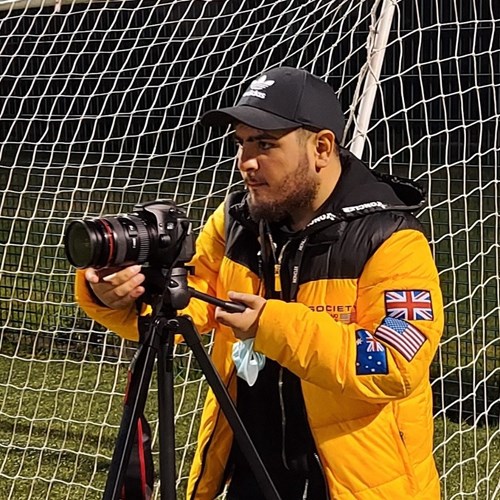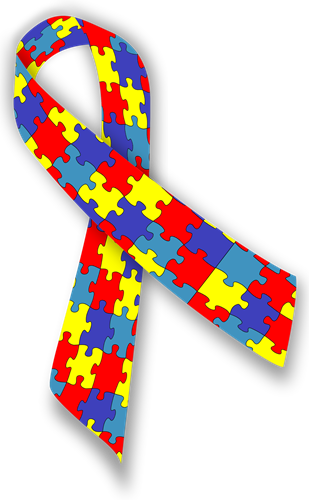BA (Hons) Multimedia Sports Journalism student Ersen Kayin suffers from mild autism, having been diagnosed 17 years ago at the age of four. The UCFB Wembley student has courageously shared what it’s like living with the disability for this year’s World Autism Awareness Week…

What is Autism?
Autism spectrum disorder (ASD) is a neurodevelopmental disorder characterised by deficits in social communication and the presence of restricted interests and repetitive behaviour.
ASD is influenced by both genetic and environmental factors affecting the developing brain and enumerate factors that correlate with ASD risk. One in 100 are on the autism spectrum and there are 700,000 autistic adults and children in the UK.
The symptoms of ASD include: anxiety, depression, obsessive compulsive disorder, attention deficit hyperactivity disorder, tic disorders and learning disabilities. This all relates to my behaviour each day. Autistic people struggle with sleeping, eating and adapting to a social environment.
My diagnosis
I was diagnosed as autistic aged four which was a blessing because I sort of knew I was unique compared to everyone else. I grew up with a different mind-set, I was very emotional at a young age. I struggled to fit in because people thought I was weird, loud and aggressive, when really I was just trying to fit in.
Traits I struggle with due to autism:
- Anxiety – I throw anxiety attacks, panicking left right and centre;
- Forgetting the simple things – leaving items and failing to remember what happened;
- Losing things and dropping or breaking things, as well as a lack of awareness.
Me and my autism
Sometimes I have anxiety attacks and I often struggle to contain myself. I scream, head-butt my bed or jump around aggressively and lose control. I sometimes do headstands and kick the walls.
It goes on for five minutes; my family leave me to it, naturally I calm down but feel anxiety from it. It is uncontrollable. I am fidgety and I struggle to make eye contact. I require support and social activities to get me through. I still feel like an outsider everywhere I go.
I have learnt over time that you yourself are your best friend and your company is your best because no one disturbs you or disagrees. I like being alone, but I hate feeling lonely.
Misconceptions
One big misconception people have about me is that I come across as loud and aggressive. There could be a debate about a topic and people would not want to talk to me or involve me in discussions because of the volume of my voice. Moreover, I always talk too much because I don’t know when to stop.
It is irritating, I cannot realise until after it happens. I am passionate about a topic because I care whether I am right or wrong. I never intend to come across as aggressive; people have a go at me for acting like everything has to go my way, yet they do not understand how I feel. I feel manipulated, and guilt-tripped unnecessarily.
Another misconception people have is that autism is an excuse for when I do something clumsy, when actually I have struggled with awareness my whole life. Often I would be told: “You are making excuses.”
Often people would say to me they would not want to go somewhere with me because I would need to be babysat or the day would be about me – yet all I wanted to do was have a day with no drama.
How I cope
I manage these things by keeping myself occupied by listening to music and talking to friends. But it is so important to express your feelings; it relieves stress knowing someone is reading this and learning.
If anyone is going through something similar, it really isn’t a big deal and people shouldn’t be embarrassed by what you do. You do not need to care what others think because they cannot understand your situation.

Life at UCFB
Higher education has been a major hurdle but it has made me grow as a person. Student Services showed me vital ways to keep grounded and focused on the work ahead, even during difficult times.
UCFB has helped me improve my communication skills in a team. I have learnt how to engage and listen. Despite COVID-19 I was able to contribute to a 15-minute TV package by offering ideas, feedback and motivation; I found my strength which is my positive energy. I was not a burden, I was an asset.
UCFB also offered me vital support with equality focus and managed to get me a brilliant tutor and mentor who always offered me support when I was feeling down. They have helped me improve my composure ahead of the endless deadlines, improve my confidence and improve my discipline.
Work experience
I also found vital work experience at a football team, FC Baresi, as a cameraman. Everyone at the club has showed me love from the first day, and it is a place where I can be myself. I show a lot of heart, charisma and support because they treat me like a friend, but also offer constructive criticism and honesty when I need it.
I have improved as a cameraman there and also been assisting the team with ideas for videos, capturing awesome photos for their website and commentated on a compilation which was the most fun of all because I expressed myself.
Advice for people encountering those with autism
To those working with people with autism, let them express themselves, earn their trust and make them comfortable. Show that you care enough and make effort. It is also vital you stand up for them; in school I got along with certain teachers because they stood up for me when I needed it, offered me extra support and guidance around people and I learned vital social skills.
Showing support instead of singling them out makes them feel comfortable in your space. It enables them to focus and improves their attitudes to learning.
Finally
In the future I aspire to become a presenter, whether it is on radio, YouTube or on TV. Presently, I am working on my dissertation where I am researching the representation of autism in the media, because autism is not spoken about enough and there should be more support available.
Autistic people are intelligent and most have a different mind-set in society, while their strengths are not utilised. For my research I have created a questionnaire about autism and its representation:
Thank you for answering the questionnaire above. Let us continue to raise awareness of autism, and help people younger than me avoid these experiences.

















